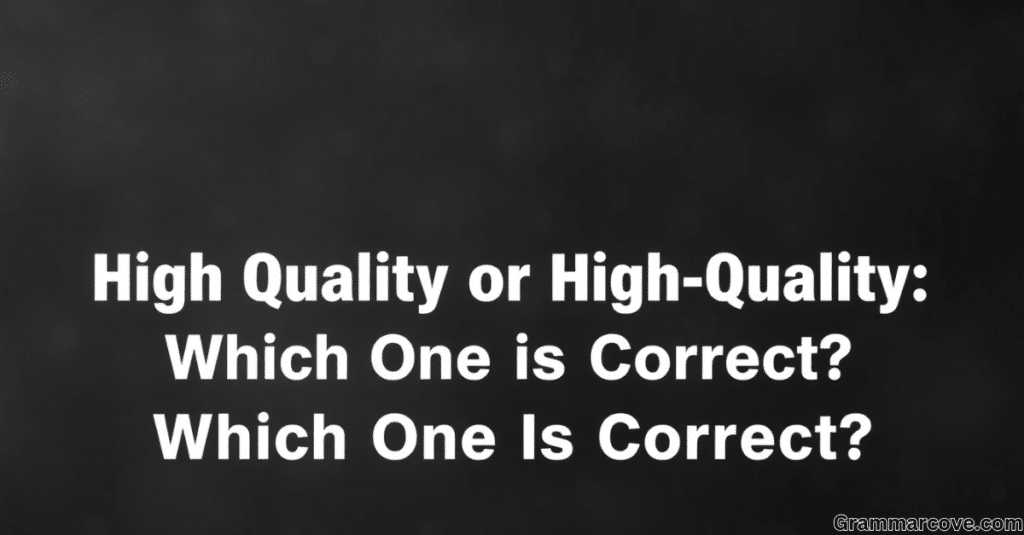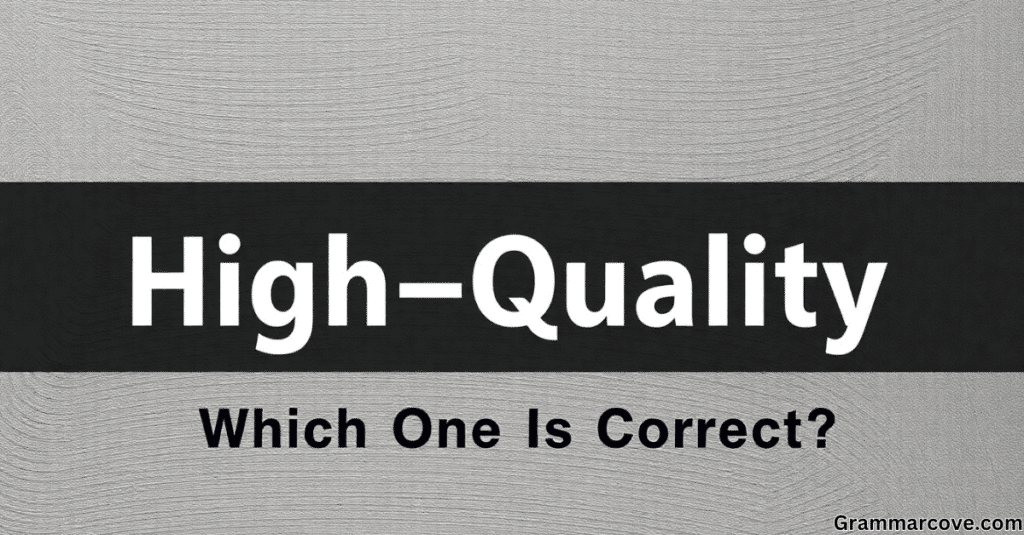
The English language is full of nuances, and one of the most common sources of confusion for writers, editors, and even native speakers is the correct use of hyphens in compound adjectives. High quality and high-quality are prime examples of this dilemma. Although they may seem interchangeable at first glance, there’s a subtle difference that hinges on the rules of grammar usage and hyphenation.
In this article, we’ll explore both forms, provide real-life scenarios, and offer clear explanations to help you understand when and how to use them correctly.
What Are Compound Adjectives?
To grasp the difference between high quality and high-quality, it’s essential to first understand what a compound adjective is. Simply put, a compound adjective consists of two or more words combined to modify a noun. The purpose of these noun phrases is to give more specific details about the noun they describe.
For example:
- Top-notch service
- First-rate products
- Superior-quality materials
When you create a compound adjective, you often need to decide whether to use a hyphen or leave the words separate. This decision primarily depends on the role the adjective plays in the sentence. Let’s dive deeper into this concept.
The Case for “High Quality”
In general, high quality (without the hyphen) is used when the phrase functions as a noun or when it’s not directly modifying a noun. This is typically the more straightforward usage. Here’s an example in a product description:
Example:
Subject: High Quality Materials for Your New Project
Dear Sarah,
I hope you’re doing well. I wanted to let you know that we’ve sourced the high quality materials you requested for the upcoming project. These products meet our quality standard, and I’m confident you’ll be pleased with the results.
Please let me know if you need further details.
Best regards,
John
In this case, high quality refers to the noun phrase and does not directly modify another noun. The focus is on the concept of quality itself, rather than describing something specifically as high-quality.
When used in this way, high quality is often seen in phrases like:
- The high quality of the service
- The high quality of the product
- We demand high quality in our work
Notice that when used as a noun phrase, there is no need for hyphenation.
The Case for “High-Quality”
On the other hand, high-quality (with a hyphen) is used when the phrase is functioning as an adjective that modifies a noun. Hyphen usage in adjectives is essential here because it links the two words together to form a single idea. Without the hyphen, the meaning can become unclear, or the phrase might be mistaken for two separate adjectives. Here’s an example:
Example:
Subject: High-Quality Service at Its Best
Dear Tom,
I wanted to personally recommend our new partner, GreenTech Solutions. They provide high-quality service that’s second to none. Their commitment to superior quality and customer satisfaction is remarkable.
Feel free to reach out if you’d like more information.
Best regards,
David
In this case, high-quality directly describes the service and acts as a compound adjective. Without the hyphen, the sentence could be confusing or unclear. For example, “high quality service” might lead to an interpretation where high is an adjective modifying quality, which isn’t the intended meaning.
Why Hyphenation Matters
Hyphenation in adjectives is important because it ensures writing clarity and helps readers understand the relationship between words. Without the hyphen, there’s often confusion over how the words function in a sentence. Let’s look at a quick comparison:
- High-quality products: Here, high-quality works as a compound adjective modifying products.
- High quality products: This could mean that the products are of a high level of quality, but the lack of a hyphen makes the meaning less precise.
In technical writing, such as product descriptions or quality control manuals, precision in writing is especially important. Using high-quality versus high quality can make a significant difference in communicating the intended message.
Examples of Correct and Incorrect Hyphenation

To solidify your understanding of when to use a hyphen, let’s break down a few more examples:
Correct Usage:
- High-quality craftsmanship
- Premium-quality materials
- Top-notch service
- Superior-quality products
Incorrect Usage:
- High quality craftsmanship (should be high-quality)
- First rate products (should be first-rate)
- Low quality standard (should be low-quality)
In each of these cases, the hyphen joins two words to act as one compound adjective, ensuring clarity and making the sentence flow smoothly.
When to Avoid Hyphenation
Not all compound adjectives require a hyphen. If the adjective comes after the noun, or if it’s not modifying a noun directly, you typically do not need a hyphen. Here are some examples where you wouldn’t use one:
- The service is high quality.
- The materials are of superior quality.
- The project meets a first-rate standard.
In these examples, the compound adjectives are acting more like noun phrases and not directly modifying a noun, so they don’t require a hyphen.
Adjective Usage and English Grammar Rules
A strong command of adjective usage and English grammar rules will help you determine whether to hyphenate compound adjectives like high-quality or leave them separate. As a general guideline:
- Use a hyphen when the compound adjective directly precedes a noun.
- Don’t use a hyphen when the adjective comes after the noun or when it’s not modifying a noun.
Additionally, be aware that some compound adjectives always require a hyphen, no matter where they appear in the sentence. Examples include:
- Well-known brand
- First-class service
- Long-term goals
The Importance of Precision in Writing
While English grammar rules are essential, precision in writing is just as crucial. Consider these two sentences:
- Our company provides high-quality customer support, with an emphasis on excellence.
- Our company provides high quality customer support, with an emphasis on excellence.
While both sentences technically make sense, the first one, with high-quality acting as a compound adjective, sounds more polished and professional. It also makes it clear that high-quality modifies the customer support, rather than suggesting that high is an adjective modifying quality.
Quality Standards and Excellence in Business
Businesses that prioritize excellence and superior products understand the importance of maintaining a high standard across all areas of operation. This extends to everything from product descriptions to quality control processes. Here’s how a company might communicate its commitment to quality through careful word choice:
Example:
Subject: Superior Products, Premium Quality
Dear Laura,
Thank you for considering our line of eco-friendly home goods. We take immense pride in delivering only premium-quality items that meet the highest quality standards. Our superior-quality products are crafted with precision and care, ensuring that every purchase exceeds expectations.
Looking forward to working with you.
Sincerely,
Michael
In this example, the use of high-quality, superior-quality, and premium-quality highlights the business’s commitment to delivering products of the highest quality. This also demonstrates how specific and deliberate noun phrase structure can convey professionalism and trustworthiness.
Recap: When to Use High Quality vs. High-Quality
Here’s a quick recap of the rules for using high quality and high-quality:
- High quality (no hyphen): Use when the phrase functions as a noun or is not directly modifying another noun.
- Example: We strive for high quality in all our services.
- High-quality (with hyphen): Use when the phrase acts as a compound adjective modifying a noun.
- Example: Our company provides high-quality service every time.
Additional Tips for Adjective Usage and Hyphenation:
- When in doubt, check if the compound adjective is modifying a noun directly. If it is, use a hyphen.
- Always consider writing clarity and precision in writing—make sure your audience clearly understands the message.
- When writing for business or technical purposes, stick to the correct grammar usage for adjective and noun phrase structure to maintain professionalism.
Conclusion
Understanding when to use high quality and high-quality is crucial for clear, precise, and professional communication. Hyphenation plays a key role in forming compound adjectives, ensuring that your writing conveys the right meaning. By following the guidelines laid out in this article, you’ll be able to confidently navigate the rules of hyphen usage in adjectives and apply them correctly in any context. Whether you’re crafting a product description, writing an email, or ensuring your company’s quality control standards are upheld, your attention to detail in adjective usage will help you communicate with clarity and professionalism.


